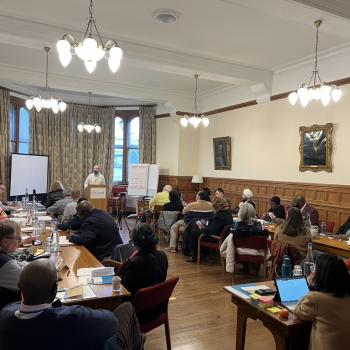The Fourth of July, one of my all-time favorite holidays, is all about progress. Regarding human rights, freedom, and the common good, anything that takes our nation backward contradicts the spirit of America’s signal celebration. Christians should be among the first to appreciate and practice this principle. The founding generation intended it as America’s enduring social and political culture. After all, progress reflects our spirituality of personal growth, increased understanding, and incremental sanctification.
GOD AND COUNTRY
During my 35 years on the religious right, I traveled the U.S., speaking at countless “Faith and Freedom” services. Evangelical congregations hold these annual patriotic-themed Sunday worship events on a weekend close to July 4. The program typically includes singing the National Anthem and other popular songs like God Bless America and America the Beautiful. The crescendo is often a solo performance of country singer Lee Greenwood’s crowd-pleaser, “God Bless the U.S.A.,” with its chest-thumping refrain, “I’m proud to be an American!”
My part in these extravaganzas was to deliver a stirring sermonic speech. I was often asked to focus on our country’s unique commitment to God, life, and liberty. (That other Creator-endowed right listed in the Declaration’s preamble, “the pursuit of happiness,” was too risky to include!) My theme usually revolved around the Constitution’s guarantee of these rights. I would especially emphasize the First Amendment’s protection of religious freedom. My argument was that this created a unique geopolitical platform for advancing the Christian message globally.
OUR PATRIOTIC IMAGINATION VS REALITY
Doing these events now would present new challenges for me because I see July 4’s framework differently than I once did. In the past, I treated the promises of the Declaration and the words of the Constitution as a fait accompli; our rights were all realized, and nothing was left to do about them. (The one glaring exception my cohorts and I always cited was Roe v. Wade, the misguided 1973 Supreme Court decision that stole the right to life from unborn babies. Now that it’s collapsed–and I think very differently about that, too–it would make the exercise even more difficult for me to repeat!)
Today, I’m struggling to come to terms with the grotesquely unrealized July 4th promises for so many in America. To do so, I’m trying to make sense of the severe backward social lurching epitomized in the stubborn evangelical embrace of Donald Trump, the ugly reactionary Christian nationalist impulses in the Republican Party and even Congress, and, worst of all, recent retrograde decisions by a highly politicized majority of the Supreme Court. Knowing I contributed to some of this regression leaves me highly motivated to do what I can to fix it.
FREDERICK AND JESUS
Young Douglas To help me and other Christian Americans like me to resolve this conflict between the ideals of the Declaration, the Revolution, the Constitution, and our country’s checkered past and present, I’ve looked in two places: Frederick Douglas’s masterful 1852 speech “What to the Slave is the Fourth of July?” and Jesus’ “new covenant,” in Luke 22:20, inaugurated as He instituted what Christians know as Holy Communion.
The epitome of the formerly enslaved Douglas’ take on the Fourth is his painfully rhetorical question, “What have I, or those I represent, to do with your national independence? Are the great principles of political freedom and of natural justice, embodied in that Declaration of Independence, extended to us?” The answer back then to Douglas’s haunting interrogation was not at all, and the answer now is only ever so partially—and getting worse.
In Douglas’s day, the overwhelming and singularly empowered white male majority did not include Blacks in their contemplation of America’s birth because persons of African descent were subhuman, ipso facto, irrelevant to the Declaration’s promises. The apologist Douglas used his superior intellect, soaring oratorial skills, and incisive analysis of America’s original sin to indict the Founders and awaken the conscience of every generation of Americans since then. (I’m all for making the recitation of this speech as much a part of the Fourth as hot dogs and fireworks!)
The help Jesus offers in this regard to American Christians and our fellow believers everywhere is his all-important characterization of His covenant or agreement with us as something “new.” Elsewhere He would illuminate how we are to express this new arrangement by contrasting it with what was old. For example, in His incomparable Sermon on the Mount, Jesus instructs, “You have heard that it was said, ‘Eye for eye and tooth for tooth.’ But I tell you not to resist an evil person.” (Matthew 5:38-39)
The conservatives of Jesus’ day wanted to preserve how things had always been done–or, at least, how they liked to do things. In this case, tit for tat, “eye for eye.” Jesus said His way would be different. In contrast to primitive retribution, His disciples must push against their impulses and do better. We have voices clamoring for revenge today, among them one congressman who literally called for a return of “an eye for an eye.” Donald Trump, Jr., did the same when he dismissed Jesus’ teaching on turning the other cheek as having “gotten us nothing.”
GETTING WOKE
Awakening our consciences to these contradictions to human freedom and flourishing and the Christ-like life–becoming morally, spiritually, and intellectually “woke,” if you will–requires we deliberately expand our consciousness through listening deeply, learning empathetically, acting in humility, and devoting ourselves to the betterment of our fellow human beings. It means individually, communally, and universally working on expanding inclusion, affirmation, and the embrace of all. This includes extending the full franchise to those whose access is harder than ours. It doesn’t matter whether our interference with their access is witting or unwitting. This last point also has a nexus with Jesus. He severely rebuked his day’s religious fundamentalists and social conservatives. They blocked others from enjoying the very benefits they had available to them. (See Matthew 23:13)
Since America’s inception, our course as a nation has run on parallel tracks politically and religiously. The first waves of settlers included religious crusaders and refugees. The revolutionaries appealed to pastors and parishioners to support the cause, dividing churches between loyalists and rebels. The founder of my Methodist denomination, the great 18th-century British missionary evangelist John Wesley, condemned the American Revolution as a “widespread lunacy” conducted by people as insane as occupants of London’s notorious Bedlam asylum. Wesley was a conservative in this sense, striving to maintain the monarchial status quo against disruptive change. On the other hand, Virginia minister Paul Muhlenberg typified the colloquial “Black Robe Regiment” of clergy backers of the war against England, arguably agents of radical change.
FAITH AS A UNIFIER OF A BADLY DIVIDED COUNTRY
Of course, these divisive tensions between religious traditionalists and progressives, political conservatives and liberals persist among Americans today. Right-wing evangelicals and Roman Catholics have worked relentlessly and expensively to pull Christians back to when “God and country” were imagined as equal and unquestioned objects of devotion. At the same time, the social and business conservatives with whom they make common cause seek to leverage faith. They need it to prosecute their culture war or reduce the scope of government. This is especially true when it comes to regulation and social programs.
Sociologists and philosophers must take on the ominous divisions among the general populace in this 247th year of America’s existence. And religious scholars and theologians- especially Christians– must take on the harmful strain between and within religious communities; both elements must work seamlessly together to mend the social fabric for the good of us all.
For Americans, religion should be a unifying force, not a divisive one. This Independence Day, let us read Frederick Douglas and Jesus of Nazareth together. In doing so, let’s rededicate ourselves to renewing the never-ending progress the American Founders envisioned but couldn’t ever fully realize. The gospel, or “good news,” should generously portend good things for believers and all those around them.
We evangelicals proclaim a message based on a verse central to our understanding of that message, John 3:16. In it, Jesus says, “God so loved the world,” and, by implication, every human being in it–not just a select few. For Christians and all people of conscience, July 4th isn’t a time to shrink America’s promise. The blessings we’ve received obligate us to invite others into our country’s limitless cornucopia of freedom, prosperity, and mutual benefit!
A happy and sobering Fourth of July to you and all yours!














